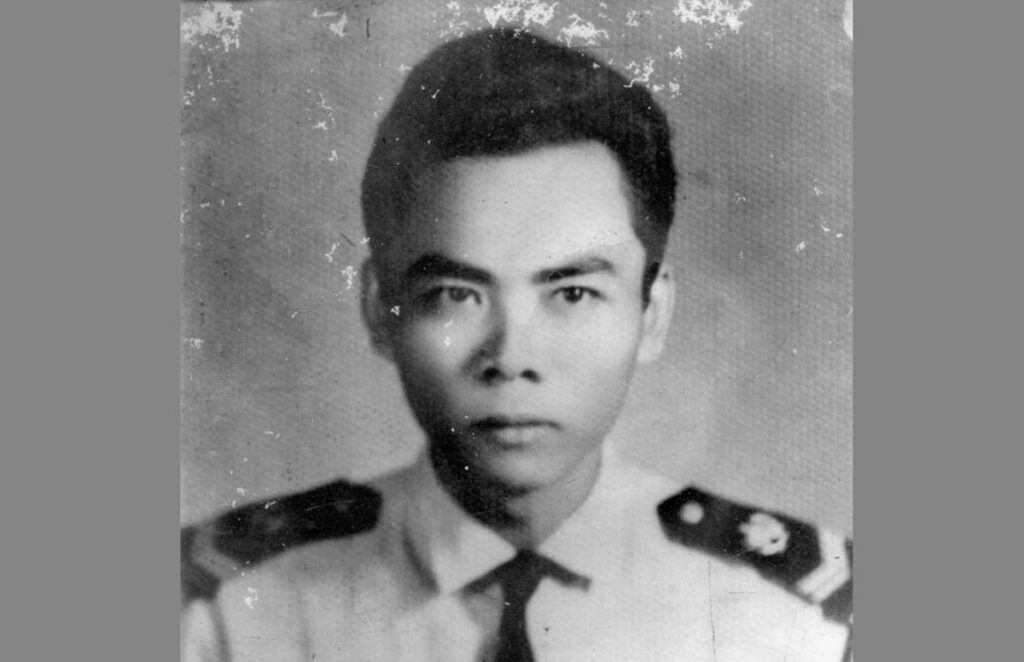loved being in uniform. I wore the uniform in this picture only when I was being promoted or having my photograph taken; when I went to work, I wore civilian clothes.
I didn’t always want to be a soldier. After finishing high school in Takeo Province, I continued studying in Phnom Pehn. I wanted to be a clerk, but failed the entrance exam, so I applied to be a policeman. Then I was sent to Kampong Cham Province for nearly two years to study civil and traffic law, the Cambodian legal code, and military tactics. After finishing, I was transferred to Kampot Province for a year and then to Koh Kong Province.
I returned to my hometown so I could look for a woman to marry. After visiting each house in the village, I found I wasn’t interested in any of the women I saw, although a number of families asked me to marry their daughters. One man even offered to buy me a motorbike if I would marry his daughter.
Then I went to the house of a teacher named Kann and saw his daughter, who was weaving silk. Kann took me to see many women, and then we returned to his house for dinner. After dinner, Kann wanted to take me to look for other women. However, I told him that his house was where I would like to stay.
A fortuneteller I saw predicted that if Kann’s daughter and I got married, we would be able to have a middle-class life and we would not be divorced. She also told me that I would probably marry a second time. So I asked my parents if they would go and meet my future wife, and they both liked her a lot. We had a love marriage; I was the one who paid the wedding dowry.
After we got married, I took my wife to Koh Kong Province and transferred to work in the medical field. I could earn much more money in Koh Kong because it had a lot of malaria. But in 1964, I was transferred to Takeo Province and then in 1970 to Kandal Province.
After studying military tactics in Vietnam for eight months, I was promoted to captain and returned to Takhmau, which was the center of operations for protecting the Phnom Penh military base. I worked in logistics and was responsible for finding food and other products.
When I was sent to fight at Sitbau Village, I became separated from other soldiers and lost consciousness for two nights and two days. My soldiers thought I had died on the battlefield, but I came back safe and sound.
After that, I spent 300,000 riel in bribes so that I could be transferred to a military office for the handicapped; I no longer wanted to go into battle. I stayed there until 1975.
On the day the Khmer Rouge evacuated Phnom Penh, they promised people they could return after a week, saying they needed time to wipe out all the enemies from the city. I hid my soldier’s uniform and guns, put on civilian clothes, and left my home. I put a few belongings on my bicycle. It took 15 days to reach my hometown.
The Angkar assigned me to stay with my parents, who were base people. All of the villagers knew my former position because I had helped them many times when I was a Lon Nol soldier. For example, once the Lon Nol military caught some Khmer Rouge soldiers who had came to buy medicine at Takhmau, but I had them released. Those Khmer Rouge were grateful for my help.
We had enough food to eat when we first arrived. The chief was very kind to me and my family. He told the Khmer Rouge cadres to take care of me. At the same time, I saw that many new people were disappearing from the village every day. The Angkar ordered me to build dams and dig canals.
Later on, the Angkar sent me to Ang Chang-E Pagoda in Samrong District. I was imprisoned there because I had been a Lon Nol soldier. Ky, who worked in the prison, told me not to say anything or I would be killed. In the room where I was imprisoned, there were no mats to sleep on, only palm leaves, and all the prisoners relieved themselves in a single jar. We worked from 4:30 a.m. until evening. After three days in the prison, the subdistrict chief told me I could sleep outside the room, and I was assigned to bring food to the prisoners.
During my imprisonment, my older brother and mother died of starvation. I was let out of the prison for a week in order to bury them.
The Angkar then sent my wife and children to live with me in the cooperative where I was imprisoned. I was assigned to be the chief of the unit that was in charge of finding food for the cooperative. Although a man named Ket told the Angkar that I did not perform my job well, the Angkar investigated my performance and realized that I had not done anything wrong. So, I continued to work there until the Vietnamese liberated Cambodia.
In 1979, I took some rice from my mother’s house, some clothes, and some US dollars I had brought from Phnom Penh long ago, and put them on a cart. Along the road to Phnom Penh, Khmer Rouge soldiers tied to shoot me. I left all my belongings on the spot and kept running.
I became fed up with my former job, and won’t allow my children to work as policemen or soldiers.

